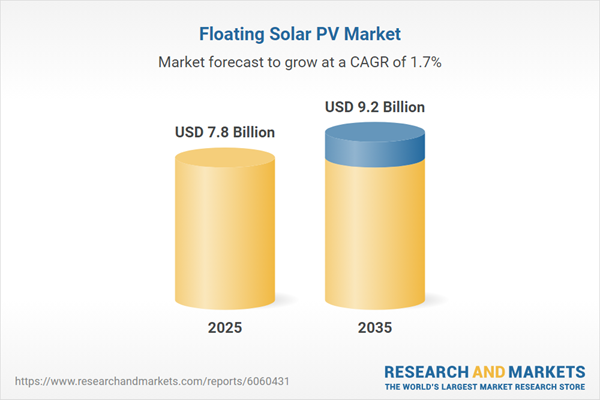Floating solar photovoltaic systems consist of solar arrays installed on water surfaces such as reservoirs, oceans, and lakes, where panels rest on buoyant structures instead of occupying land. This configuration enables power generation without competing for terrestrial space while making use of underutilized water areas. Strong adoption is emerging from the growing integration of floating solar with hydropower facilities and the ongoing improvements in material engineering, including durable floating structures and enhanced anchoring technology. These advancements support better installation stability and longer system life. Higher energy efficiency achieved through natural cooling on water and reduced evaporation rates encourages deployment in regions with elevated temperatures or limited freshwater resources. Increasing utilization in island communities and coastal territories with minimal available land further strengthens the market outlook. New platforms made with high-density polyethylene and other resistant materials are engineered to withstand UV exposure, fluctuating weather, and marine conditions, ensuring more reliable system performance across demanding environments.
The capacity category above 15 MW is expected to generate USD 4.1 billion by 2035, fueled by expanding large-scale project activity, new technical capabilities, and policy-driven support. Growing adoption in nations such as China, South Korea, and India continues to elevate utility-scale floating systems that contribute substantial power to national grids. These installations often benefit from shared infrastructure with hydropower facilities, reducing integration costs and improving financial feasibility, which has encouraged broader investor participation.
The tracking technology segment is projected to grow at a CAGR of 5.5% through 2035. Rising emphasis on maximizing solar yield is strengthening demand for advanced tracking configurations suitable for water-based projects. Countries, including Portugal and Spain, are focusing on improving renewable energy output while balancing land constraints, contributing to increased installations. Enhancements in tracking design tailored for floating environments continue to improve system adaptability and long-term reliability.
U.S Floating Solar PV Market was valued at USD 17 million in 2025. Regional growth is tied to state-level renewable initiatives and incentives that encourage the adoption of innovative solar technologies. Manufacturers such as Sungrow Group and others are developing customized floating modules capable of withstanding varying climate conditions across the region.
Key participants in the Global Floating Solar PV Market include Amoy Solar Tech, Ciel & Terre International, China Three Gorges New Energy, Floatex Solar, Intech Clean Energy, First Solar, Kyocera Corporation, Jinko Solar, Longi Solar, Ocean Sun, Scotra, SolarDeck, Swimsol, Sharp Corporation, Statkraft, Sungrow Group, Vikram Solar, Zimmermann PV, Eni Energy Solutions, and Yingli Solar. Key strategies adopted by companies in the Floating Solar PV Market aim to enhance performance, reduce installation complexities, and broaden global project footprints. Many firms are investing heavily in advanced float materials designed to improve durability and resistance in marine and freshwater environments. Companies are also focusing on modular system designs that simplify assembly and reduce construction timelines. Partnerships with utilities and government agencies help accelerate deployment across hydropower reservoirs and water treatment facilities.
Comprehensive Market Analysis and Forecast
- Industry trends, key growth drivers, challenges, future opportunities, and regulatory landscape
- Competitive landscape with Porter’s Five Forces and PESTEL analysis
- Market size, segmentation, and regional forecasts
- In-depth company profiles, business strategies, financial insights, and SWOT analysis
This product will be delivered within 2-4 business days.
Table of Contents
Companies Mentioned
The companies profiled in this Floating Solar PV market report include:- Amoy Solar Tech
- China Three Gorges New Energy
- Ciel & Terre International
- Eni Energy Solutions
- First Solar
- Floatex Solar
- Intech Clean Energy
- Jinko Solar
- Kyocera Corporation
- Longi Solar
- Ocean Sun
- Scotra
- SolarDeck
- Sungrow Power Supply
- Statkraft
- Swimsol
- Sharp Corporation
- Vikram Solar
- Yingli Solar
- Zimmermann PV
Table Information
| Report Attribute | Details |
|---|---|
| No. of Pages | 120 |
| Published | December 2025 |
| Forecast Period | 2025 - 2035 |
| Estimated Market Value ( USD | $ 7.8 Billion |
| Forecasted Market Value ( USD | $ 9.2 Billion |
| Compound Annual Growth Rate | 1.7% |
| Regions Covered | Global |
| No. of Companies Mentioned | 21 |









